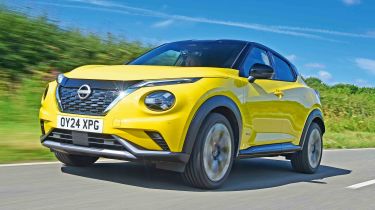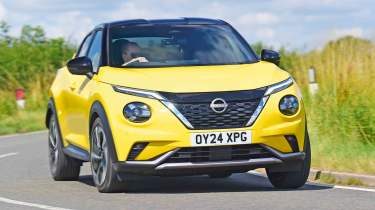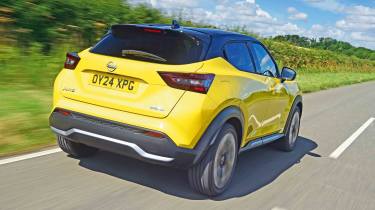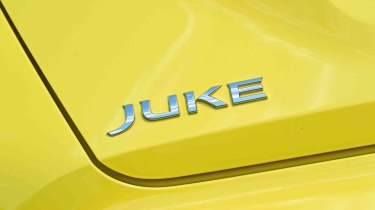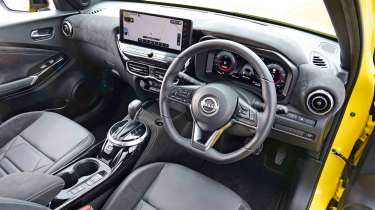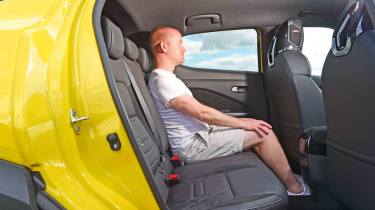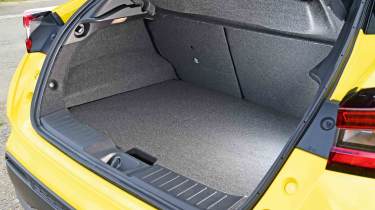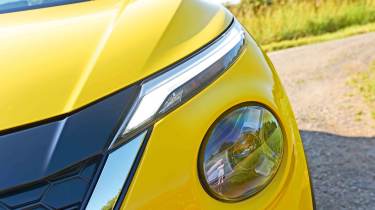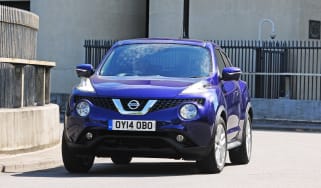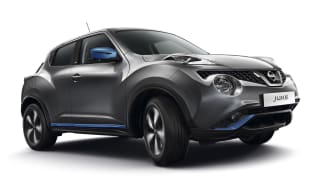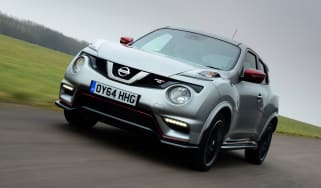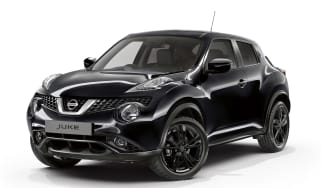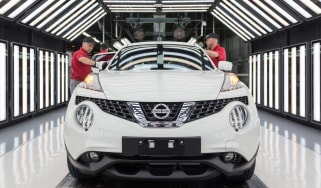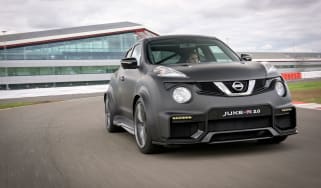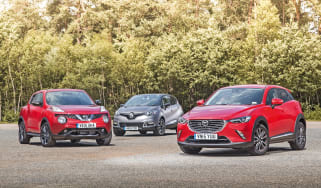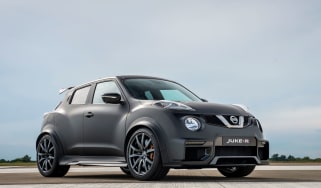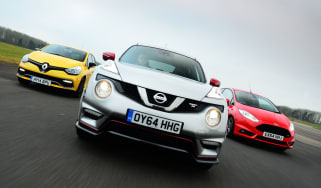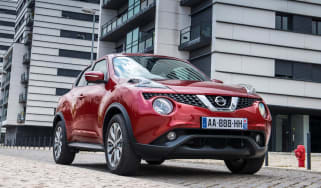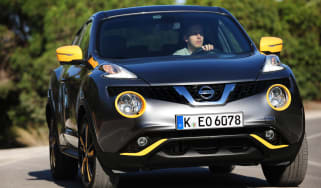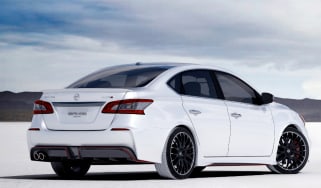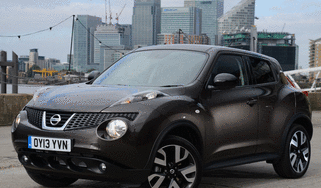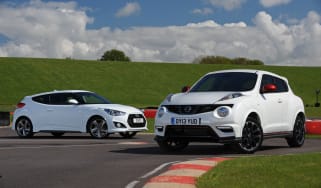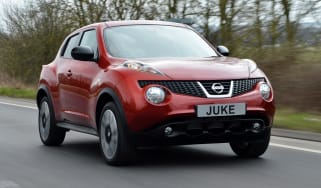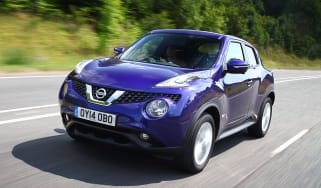Nissan Juke review
Once a trend-setter, the Nissan Juke now plays catch-up to a bunch of rivals it helped to inspire

Our opinion on the Nissan Juke
It took the best part of a decade to replace the Nissan Juke because the original was such a successful concept. But like a band following up with a difficult second album, there was a lot expected of the next-generation Juke when it arrived in 2019, and not just from its loyal fans.
Ever since the first Juke entered the charts, scores of rivals have come along to cash in on its success. Some are more practical, others are more fun to drive. And, of course, a number had gone down the electrification route. In the process of making something that tried to cater to all tastes, the resulting second-generation Juke didn't quite hit all the right notes, and now finds itself playing catch-up to some seriously accomplished competition.
About the Nissan Juke
Nissan pretty much invented the small SUV class when it launched the first Juke back in 2010. It offered butch, if slightly caricatured ‘off-road’ styling, a pleasingly elevated view of the road, and looked nothing like the boring old hatchbacks or mini MPVs that cost similar money.
However, it was just as easy to own and drive, and as a result, sales boomed. Rivals naturally pitched in behind the Juke with small SUVs of their own, but it took a while for the industry to catch up, and Nissan made hay.
Used - available now
Fast forward to now, and the playing field is littered with rivals, and while that may be a credit to Nissan’s visionary product planners, it’s a significant challenge for the firm’s engineers. Regrettably, it’s a challenge we find the second-generation Juke, launched in 2019, struggles to meet.
Nissan Juke prices and latest deals
Nissan Juke prices start from around £24,300 and go up to £29,200. Spec your ideal Nissan Juke via the Auto Express Buy a Car service, though, and you can save an average of up to £4,600. Alternatively, you can lease a Nissan Juke or find plenty of used Nissan Juke deals.
Performance & driving experience
Pros |
|
Cons |
|
While the official line is that the Nissan Juke has been tuned for UK roads, we think it was specifically tested around the roundabout-laden roads of Milton Keynes. For that, the Juke is rather adept thanks to bags of grip and excellent body control that resists body lean well in corners.
The power (and efficiency) of the 1.6-litre petrol hybrid unit certainly improves things. Keep things relaxed, using its EV mode as much as possible, and it’s relatively refined. The Juke can remain in EV mode up to 34mph before the petrol engine has to cut in, but it is quite coarse when it does so. The automatic gearbox with the hybrid Juke is generally fine if you take things easy, but it can be reluctant to change down when you put your foot down when trying to overtake.
The brakes of the regular petrol Juke work well, while the hybrid version utilises a regenerative braking system called e-Pedal that’s borrowed from the brand’s electric car range. It’s a system that lets you top up the batteries by simply lifting off the accelerator to slow down. With the e-Pedal system switched on, the car will slow very quickly (much more so than most other hybrid cars) without you needing to touch the brake pedal, as the system tries to generate as much electricity as possible to recharge the battery. Once you get the hang of it, you can almost drive the Juke with one pedal.
Both petrol and hybrid versions can suffer quite a bit of road noise – especially on the biggest 19-inch wheels. And despite its sleek body, wind noise from its chunky door mirrors can be an issue at higher speeds.
| Model | Power | 0-62mph | Top speed |
| Juke 1.0 DiG-T 114 | 112bhp | 10.7 seconds | 112mph |
| Juke 1.0 DiG-T 114 DCT | 112bhp | 11.8 seconds | 112mph |
| Juke 1.6 Hybrid | 141bhp | 10.1 seconds | 103mph |
Performance, 0-60mph acceleration and top speed
The 1.0-litre turbocharged three-cylinder petrol engine puts out 112bhp and 200Nm of torque, which is enough to give it a 0-62mph time of 10.7 seconds (11.8 seconds with the DCT auto), and a top speed of 112mph. The 1.6 Hybrid is a little quicker thanks to its 141bhp and 205Nm of torque, getting to 62mph in 10.1 seconds. Its top speed is slower at 103mph, though.
The standard 1.0-litre petrol pulls the Juke along reasonably well – but only if you keep the revs up. It can feel laggy, especially if you misjudge the revs when trying to pull away, because it takes ages before the turbo kicks in to deliver the sort of punch you need to merge into traffic quickly.
The 141bhp hybrid is the quickest Juke on offer, proving to be swifter than hybrid rivals such as the Hyundai Kona and Toyota Yaris Cross. However, the Juke doesn’t deliver its power as smoothly as those rivals. It’s almost EV-like in its responsiveness away from the lights, but demand more power out on the open road, and the Juke’s hybrid system seems to confuse itself. After an initial burst, there’s a noticeable delay before the combustion engine wakes up rather coarsely.
Town driving, visibility and parking
Around town, the quick steering of the Juke should make it feel alert and eager, but its keenness to self-centre gives it an unnatural feel that seems odd compared to the well-weighted and accurate steering feel of the Ford Puma.
It also can’t match that rival’s slick manual gear change, while the pedals in the Juke have an oddly spongy feel that makes it difficult to drive smoothly in traffic. The DCT automatic available with the 1.0-litre engine isn’t much better in this regard, because it’s jerky at slow speeds.
Parking is made quite difficult by the small rear windscreen and thick C-pillars, so you’ll often find yourself resorting to cameras and sensors. However, you’ll have to fork out for at least the N-Connecta trim if you want these particular luxuries.
Country road driving and handling
The current Nissan Juke is undoubtedly better to drive than the original model, but it doesn't quite provide the outright driving enjoyment of the Ford Puma.
On B-roads, our test car fitted with an automatic gearbox had a habit of changing down a gear more often than we would have liked, especially on steeper inclines. However, the Juke’s composed handling means corners rarely pose a problem. The Juke’s steering is well weighted, too, though a little bit lacking in feedback.
Motorway driving and long-distance comfort
The downside of the Juke’s decent handling is that the suspension has been firmed up to ensure the SUV remains level in corners, so the ride quality suffers. Go for a Tekna trim car on 19-inch alloy wheels, and the ride feels fidgety at all speeds, and unfortunately, rather unsettled and bouncy on the motorway. Such constant movements can become quite tiring, meaning more supple rivals like the Skoda Kamiq are much better suited to long-distance road trips.
MPG & running costs
Pros |
|
Cons |
|
Emissions and fuel economy for the 112bhp 1.0-litre model are dictated mainly by gearbox type and wheel size; Nissan quotes up to 48.7mpg for the manual and up to 47.9mpg for the seven-speed dual-clutch automatic, while CO2 starts from 131g/km, with the manual being the marginally cleaner option, rising to 136g/km for the auto. While those numbers aren’t bad, the Peugeot 2008 and Skoda Kamiq are cleaner and more frugal options.
The answer to those two rivals is to consider the Juke petrol hybrid, with a combined efficiency of up to 60.1mpg and emissions from 106g/km. Again, those are fair figures, but rivals such as the Hyundai Kona hybrid and Toyota Yaris Cross are still better.
All models get stop/start as standard, as well as an Eco drive mode that helps save fuel – but you’ll notice a drop in performance as a result.
| Model | MPG | CO2 | Insurance group |
| Juke 1.0 DiG-T N-Connecta | 47.9mpg | 131g/km | 13 |
|
Juke 1.0 Acenta Premium DCT
| 47.1mpg | 135g/km | 12 |
| Juke 1.6 Hybrid Tekna | 57.6mpg | 108g/km | 14 |
Insurance groups
The Juke is unlikely to break the bank in the insurance stakes; the standard petrol model range mostly occupies groups 12 and 13 (out of 50), while the hybrid is a little higher in group 14.
If you need a small SUV that’s even less costly to insure, the SEAT Arona is currently one of the cheapest cars to insure in the UK, sitting as low as group 10.
Tax
Every Juke is liable for the standard rate of VED road tax, but they manage to avoid the luxury car tax supplement, even if you decide to treat yourself to some optional extras.
If you’re a company car driver considering the Juke, the hybrid version sits in a lower benefit-in-kind (BiK) company car tax bracket (27 per cent versus 32 per cent), but you may want to look at some of the increasing of fully electric alternatives, such as the Citroen e-C3 Aircross, Ford Puma Gen-E, Hyundai Kona Electric, Kia EV3, Skoda Elroq, and Vauxhall Mokka Electric. All the rivals mentioned are in the far more affordable three per cent (rising to four per cent in 2026).
Depreciation
Our experts predict that the Juke will retain between 44 and 48 per cent of its original value after three years and 36,000 miles. For context, the closely related Renault Captur performs quite a bit better by maintaining between 52 to 55 per cent, while the Toyota Yaris Cross is likely to hold on to between 49 to 55 per cent over the same period.
To get an accurate valuation for a specific model, check out our valuation tool...
Interior, design & technology
Pros |
|
Cons |
|
The second-generation Nissan Juke is instantly recognisable as an evolution of the original compact SUV. The car’s slim daytime running lights and oversized headlamps mimic the old version’s, while the pronounced haunches and hidden rear door handles are another nod to the original.
The Juke shares plenty of common parts with its French siblings, the Renault Clio and Renault Captur because it’s based on the same platform. The Captur is more intelligently packaged, offering a sliding rear bench and up to 536 litres of boot space. Still, there’s much to like about the Nissan’s interior, including a logically laid-out dashboard and lots of adjustment in the driver’s seat.
Interior and dashboard design
The Juke may not look as upmarket as a Skoda Kamiq inside (we didn’t much rate the faux carbon-fibre trim used in our N-Sport test car), but there’s loads of kit, and the dials are easy to read. All models come with a 12.3-inch touchscreen display that’s angled towards the driver by eight degrees and is similar to what we’ve seen on the larger Nissan Ariya. Some physical shortcut buttons are provided along the bottom of the screen to make it easier to use on the move.
Materials and build quality
We have few complaints regarding the Nissan Juke’s build quality. While it’s not the most luxurious small SUV out there, it does feel well screwed together. However, the centre console’s gloss black plastic trim is perilously vulnerable to scratches.
Infotainment, sat-nav and stereo
The revised Juke comes with a 12.3-inch infotainment screen, which is significantly larger than the older eight-inch system. The home screen is customisable, allowing you to display frequently used widgets. The system also features sat-nav, wireless Apple CarPlay and Android Auto smartphone connectivity. Opt for the mid-range N-Connecta and it comes with wireless phone charging to save on trailing charging cables everywhere.
A four-speaker sound system comes standard on Acenta Premium models, moving up to a six-speaker system in N-Connecta trim. However, we prefer the 10-speaker Bose sound system that comes with Tekna trim and above. This set-up features speakers in the front headrests, which means you not only get a much clearer sound, but it’s less harmful to your hearing. The quality is excellent, and it works well no matter what kind of music, radio or podcast you like to listen to.
“The old car’s trio of circular air vents underneath the main screen have been swapped for a pair of oblong items. We’re glad that Nissan hasn’t moved them to the touchscreen, because while they’re set low on the dashboard, they’re easy to locate and use without taking your eyes off the road.” - Alex Ingram, chief reviewer.
Boot space & practicality
Pros |
|
Cons |
|
Despite its myriad specs, there is only one body style to choose from when specifying your Nissan Juke. Every version has five doors, five seats, a decent-sized boot, and a roomy cabin.
The driving position has plenty of adjustment; you sit low, and the steering wheel moves fore and aft, as well as up and down. Visibility is fine out the front, but the small side windows and rear windscreen can make parking more challenging, especially in the entry-level Acenta Premium, which only comes with a reversing camera. That might make mid-range N-Connecta worthwhile because it gets front and rear parking sensors, and you can add the Advanced Safety Shield pack (standard on Tekna and above) to get a 360-degree camera system.
In terms of cabin storage, there are some large door bins and a sizeable glovebox, but the cubby between the front seats is only just big enough for a modern smartphone, and the small area ahead of the gearlever isn’t very useful. In the back, there is a pair of door bins big enough for a 500ml bottle of water.
Dimensions and size
The second-generation Nissan Juke is wider and longer than the original, and it certainly looks more imposing on the road thanks to its raised haunches and bulbous front end. However, at 4,210mm long, it’s slightly shorter than a Skoda Kamiq.
| Dimensions comparison | |||
| Model | Nissan Juke | Skoda Kamiq | Toyota Yaris Cross |
| Length | 4,210mm | 4,241mm | 4,180mm |
| Width | 1,800mm | 1,793mm | 1,765mm |
| Height | 1,593mm | 1,534mm | 1,595mm |
| Wheelbase | 10,600mm | 2,650mm | 2,560mm |
| Boot space | 350 to 1,305 litres | 400 to 1,395 litres | 266 to 1,097 litres |
Seats & passenger space
The sloping roofline of the Juke makes it feel pretty dark in the back seats, plus the small windows might bother children wishing to look outside on longer trips. Adults under six-foot should be able to get comfortable, although those over six-foot will have a much easier time in the practically palatial Kamiq.
Two rear ISOFIX child seat points are included as standard in the Juke, which helps when travelling with younger passengers in car seats. All versions feature two USB charging sockets for those in the back seat to top up their smartphone or tablet.
Boot space
The Nissan Juke’s 422-litre boot is much bigger than before, and sizes up well in this class. However, the hybrid version has a smaller 354-litre (350 litres with the Bose sound system) boot due to parts of the hybrid system taking up space, and the Juke doesn’t get a sliding rear bench seat like the closely related Renault Captur. This would allow you to increase the available boot capacity at the expense of rear leg room.
The Juke’s back seats do at least fold down to reveal a 1,305-litre space (1,237 litres for the hybrid, or 1,114 litres for a hybrid version with the Bose speakers), which should be enough for most jobs, although the Kamiq offers an even greater 1,395-litre total capacity.
Also worth noting is the Juke’s boot opening, which is wider than before but isn’t as generous as the Volkswagen T-Roc, making it harder to load larger items into the boot. The boot floor is adjustable for height; you’ll sacrifice some space in its highest setting, but the flip side is that you won’t have to contend with any kind of nasty load lip.
The fixed parcel shelf attaches to the boot lid via a pair of strings and lifts out easily, although it feels super-flimsy, and there’s nowhere to store it. Nevertheless, there’s enough space for a road bike in the back.
Towing
The 112bhp petrol model has a maximum braked trailer weight of 1,250kg, while the hybrid version is rated to tow a braked trailer with a total 750kg load.
For greater towing capacity in a small SUV, look at the Dacia Duster, because some versions can tow up to 1,500kg.
“As if to prove that the Juke isn’t very big in the back, it doesn’t have a fold-down centre armrest in the middle seat. There’s a seatbelt, but shoulder space will be tight if you’re travelling three-up.” - Alex Ingram, chief reviewer.
Reliability & safety
Pros |
|
Cons |
|
The Nissan Juke is a thoroughly modern small SUV offered with an array of active safety and driver assistance systems: all models get an emergency call system, cruise control with speed limiter, autonomous emergency braking (AEB), lane-departure warning and traffic-sign recognition.
The optional Advanced Safety Shield pack on N-Connecta (standard on Tekna models and above) adds traffic jam and lane-keeping assist, adaptive cruise control, driver-alertness monitoring, blind spot warning and intervention, and rear cross-traffic alert. It is a shame adaptive cruise and blind spot warning aren’t standard, though, like they are on every version of the Volkswagen T-Cross.
The Juke received a middling score of 27th out of 50 in the latest Driver Power customer satisfaction survey, ahead of the Ford Puma (47th) and Volkswagen T-Roc (38th), but behind the Vauxhall Mokka (18th). Nissan, as a brand, came in 15th place out of 31 manufacturers in the same survey.
| Euro NCAP safety ratings | |
| Euro NCAP safety rating | Five stars (2019) |
| Adult occupant protection | 94% |
| Child occupant protection | 85% |
| Vulnerable road user protection | 81% |
| Safety assist | 73% |
Buying and owning
We think the best version of Nissan Juke is the N-Connecta trim because it adds lots of useful equipment. The choice between the two engines is up to your circumstances. Go for the hybrid if you can afford it because it is the better ownership prospect, but it is hard to overlook how much cheaper the 1.0-litre petrol is in comparison.
Nissan Juke alternatives
The market is awash with small SUVs, and plenty of them make a convincing case for themselves. The Ford Puma is by far one of the nation’s best-selling cars, as well as being one of the very best small SUVs to drive. Elsewhere, the Vauxhall Mokka, Peugeot 2008, Skoda Kamiq, Toyota Yaris Cross and SEAT Arona make up just some of the Nissan Juke’s rivals. In other words, you really are spoilt for choice here.
Frequently Asked Questions
The Nissan Juke is a good-looking small SUV that can be had with lots of useful driving-assistance technology. It handles tidily, but isn’t as much fun to drive as a Ford Puma, and isn’t as practical or as comfortable as a Skoda Kamiq.
Deals on the Juke and alternatives
